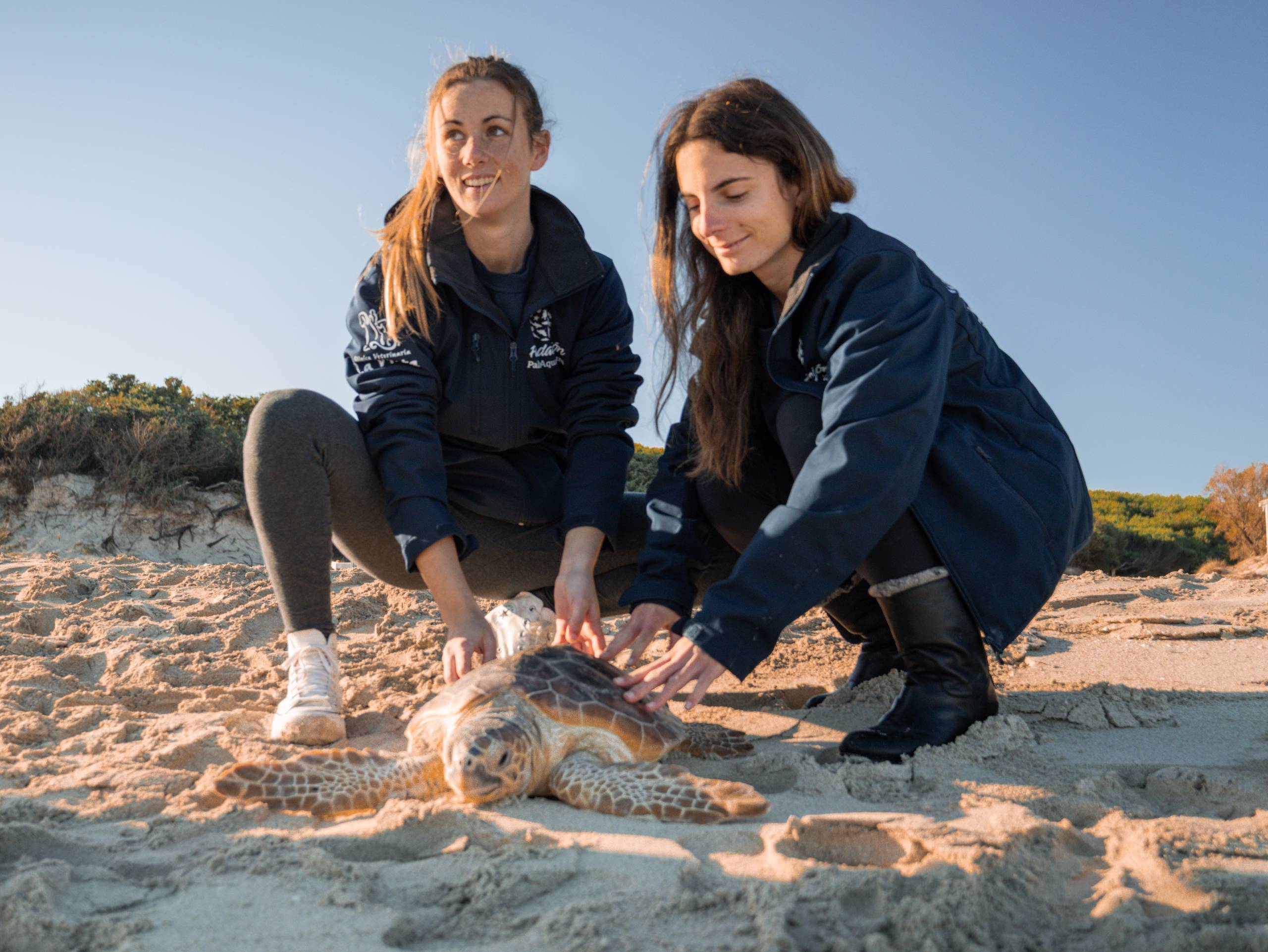The Balearic Islands are home to a remarkable variety of marine life. However, this habitat, which should be a safe and thriving environment for the species that live there, faces numerous threats due to human activity and changes in the marine ecosystem.
In response to this critical situation, the Palma Aquarium Foundation is actively involved in the OCEMIB Project, an initiative dedicated to the rescue, rehabilitation and conservation of endangered marine species in the Balearic Sea. Since its launch in June 2022, the project has recorded 200 animals (alive and dead). This number includes 63 sea turtles that were found alive and received care, 57 of which were successfully rehabilitated and returned to the ocean.
The project receives backing from the Biodiversidad Foundation of the Spanish Ministry for Ecological Transition and the Demographic Challenge (MITECO by its Spanish initials) though the Recovery, Transformation and Resilience Plan (PRTR by its Spanish initials) and finances with #NextGenerationEU funds. The service is managed by the Balearic Islands Wildlife Recovery Consortium (COFIB by its Spanish initials), which is part of the fauna protection service run by the Regional Ministry of Agriculture, Fishing and the Environment. This collaboration with the team at the Palma Aquarium Foundation means that the following goals can be achieved:
Project goals
- To improve the management and conservation of endangered marine species, such as sea turtles, cetaceans, and sharks.
- To collect scientific data from strandings to further our knowledge of these species and the threats they face.
- To protect species and reduce the mortality of their populations.
- To identify and assess existing and emerging
- To raise awareness and get the public involved in the protection of these species.
- To increase scientific and technical knowledge about these species that will better support their conservation.
Which animals do we protect?
Through the OCEMIB Project, we protect three groups of marine species that are essential for maintaining the balance of our marine ecosystem:
- Sea Turtles: The principal threats facing this species are ghost nets, the ingestion of plastic, collisions with vessels and loss of habitat. The Palma Aquarium Foundation handles rescues, rehabilitates the sea turtles at the recovery centre and releases them back into their natural environment.
- Cetaceans: Dolphin and whale strandings are dealt with in situ and the corresponding protocols are activated.
- Sharks: We rescue and care for these animals, which are key indicators of the health of our oceans.
What do we do?
The OCEMIB Project team works tirelessly to ensure that each animal receives the best possible care. Below are a few of the activities we carry out:
- Assistance, diagnosis and treatment: We take charge of providing primary care, as well as diagnosing and treating sea turtles, cetaceans and sharks.
- Rehabilitation and release: Our ultimate goal is to reintroduce these animals into their natural habitat. This requires rehabilitation programmes aimed at ensuring that the animals are in optimum conditions before being released back into the sea.
- Scientific research: We participate actively in scientific studies that seek to obtain a greater insight into the populations, as well as the threats facing these species and how to tackle them.
- Environmental education: We run educational workshops and activities to raise awareness within the community of the problems facing the Balearic Sea and the importance of protecting our marine ecosystems.
Rescue protocol for endangered species
An essential part of the OCEMIB Project is the active collaboration of the community in protecting endangered marine wildlife. If you come across a marine animal that is stranded or in danger, it is crucial to follow a specific protocol to maximize its chances of survival. This protocol includes steps such as immediately calling the corresponding authorities (112); not touching the animal or removing any nets or lines; and, wherever possible, keeping the animal in the shade and protected from the sun until help arrives.
The correct implementation of this protocol can make the difference between life and death for these animals. Below is the detailed protocol you should follow.
Should you encounter a dead marine animal, you should also call 112, as these specimens can provide valuable information and samples to help understand these populations and the threats they face.
VIEW : What to do if you find a sea turtle in distress?
Palma Aquarium Foundation’s OCEMIB Project is crucial for the conservation of the Balearic Islands’ endangered marine life, as it provides us with essential data on the Balearic Sea’s most emblematic species and the threats they face.
Indeed, these data are necessary in order to create a standardised database that lays the foundations for managing and conserving these species, guaranteeing that our actions are rooted in solid scientific evidence.
Through assistance, rehabilitation, research and education, the project seeks to protect the most vulnerable species and drive lasting community awareness of the importance of preserving our oceans and the life they sustain.
Protecting these species not only ensures biodiversity but also maintains the balance of marine ecosystems, which are essential for the health of our planet.


 "
"
